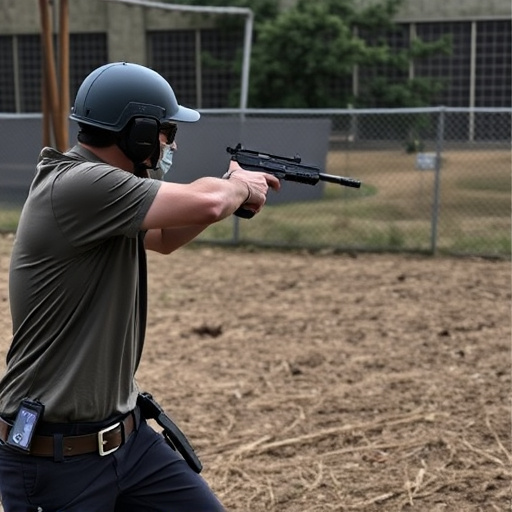Exposure to pepper spray requires immediate action: move to fresh air, remove contaminated clothes, rinse affected areas with water, and seek medical attention if symptoms persist or worsen, as proper care is vital for mitigating discomfort and ensuring safety until professional help arrives.
“Uncover the power of pepper spray as a deterrence and its impact on personal safety. This article delves into the science behind this non-lethal weapon, exploring its active ingredients and immediate effects. We break down how pepper spray disrupts sensory perception, causing temporary incapacitation.
Additionally, we provide essential insights into effective countermeasures and immediate care techniques for those exposed, ensuring a comprehensive understanding of pepper spray deterrence and post-incident treatment.”
- Understanding Pepper Spray's Active Ingredients
- How Pepper Spray Affects the Body Immediately
- Effective Countermeasures and Immediate Care Techniques
Understanding Pepper Spray's Active Ingredients
Pepper spray, a common self-defense mechanism, uses capsaicin, the active ingredient found in chili peppers, to cause temporary disorientation and pain. This irritant targets the eyes, nose, and respiratory system, limiting an attacker’s mobility and perception. Understanding these active ingredients is crucial for immediate care after exposure.
In cases of pepper spray contact, the first step is to seek fresh air immediately. Removing contaminated clothing and rinsing affected areas with water can help alleviate symptoms. Eye irrigation or a cool compress on the face may provide some relief from irritation. It’s essential to remember that symptoms can persist for several minutes to hours, so seeking medical attention might be necessary if breathing difficulties or prolonged discomfort occur. Immediate care focuses on minimizing discomfort and ensuring safety until professional assistance arrives.
How Pepper Spray Affects the Body Immediately
When exposed to pepper spray, the body experiences an immediate and intense reaction. The chemical compound, capsaicin, targets the nervous system, causing a burning sensation and triggering a series of physiological responses. This leads to the typical symptoms associated with pepper spray exposure: watery eyes, nasal congestion, coughing, and difficulty breathing. The immediate effects can be debilitating, hindering vision and respiratory function, and leaving individuals disoriented.
Proper immediate care is crucial for mitigating the impact of pepper spray. Those affected should move to a safe area away from the source. Breathing exercises can help clear the lungs and alleviate coughing. Flushing the eyes with clean water for at least 15 minutes reduces irritation and discomfort. Seeking medical attention may be necessary if symptoms persist or severe reactions occur, ensuring prompt care and relief from pepper spray’s debilitating effects.
Effective Countermeasures and Immediate Care Techniques
In the event of exposure to pepper spray, immediate care is crucial for mitigating its effects. The first step is to move to a safe location away from the source of the spray. Removing contaminated clothing and washing affected areas with plenty of water is essential to flush out the irritants. Breathing exercises can help clear the lungs; coughing or bending over should be avoided as these actions may exacerbate the irritation.
Seeking immediate medical attention is vital, especially for severe cases. Healthcare providers can offer specialized treatment, including eye washes for conjunctivitis and oxygen therapy for respiratory distress. Over-the-counter pain relievers can alleviate headaches and body aches. It’s important to remember that while at-home remedies provide temporary relief, professional medical care ensures any long-term effects are addressed promptly.
Pepper spray, while a powerful deterrent, can have significant immediate effects on the body. Understanding its active ingredients and how it interacts with the senses is key to implementing effective countermeasures. By knowing the proper immediate care techniques, individuals can mitigate the impact of pepper spray exposure and ensure faster recovery. For anyone facing potential encounters, being prepared with knowledge about this defense mechanism is an essential step towards enhancing personal safety.
